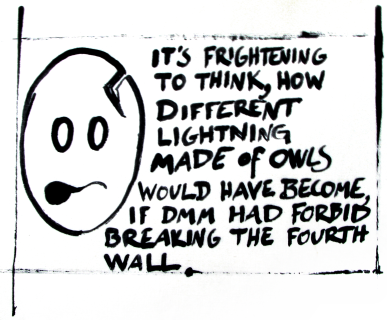» Contribute » Cast » Archive » Authors » Search » Random » Resources » Statistics » Forum » RSS Feed Updates Mon, Wed, Fri when available
No. 328: DMM Forbid
First | Previous | 2011-01-24 | Next | Latest

First | Previous | 2011-01-24 | Next | Latest
Permanent URL: https://mezzacotta.net/owls/?comic=328
Strip by: qvaak
Oliver: It's frightening to think, how different Lightning Made of Owls would have become, if DMM had forbid breaking the fourth wall.
The author writes:
This is another fun filled gag from my (failed) seven-in-two-hours-quite-like-Panpear challenge. I had managed three or four strips, and I had about fifteen minutes left. My mind was humming numbly. - Well, I thought. I need very simple ideas. Ideas that do not require higher level brain functions and that can be expressed in one simplistic picture each. I must resort to meta-meta jokes and jokes on identifying features.
Less than ten minutes later I had my meta-funny meta joke on meta jokes joke ready.
It's kind of funny, I think.
Anyway, somewhat on the topic: To my counting there are three quite different ways to break the fourth wall. The most obvious and defining is when a character in a comic (or what ever; movie?) looks at the reader ("at the camera") and speaks directly to them. The wall between the reader and the character is clearly lifted. However I feel this isn't usually the harshest way to maul the wall. The character steps out of the fictional reality [what would be a good word for reality inside a fiction? I usually use diegesis, but that's a technical term from a field I'm not too familiar with, and I feel I might abuse the word rather badly] to share their thoughts with us, but after they have shared them, they can easily step back into the diegesis [see? I used it] and continue as if nothing had happened. The fictional world can still be considered hermetic.
Much harsher way to break the wall is when the characters discuss things outside their reality with each other. The fourth wall breaking is less literal as the characters often don't look at the camera, but nevertheless the wall gets pummeled much harder (into teeny tiny bits). It is much more difficult to compartmentalise the situation out of the diegesis and often the characters now even motivate their actions based on knowledge from outside their world.
And then on the other hand there is the subtle crack in the wall variant, where everything can be explained and motivated inside the diegesis, but we readers can see some external reasons behind seemingly irrelevances and coincidences. All intertextual stuff falls more or less into this category.
Well, the funny picture above has so little diegesis it hardly has any walls at all. So no fourth wall breaking there, eh?
...
One more thing. Is "had forbid" just kinda wrong or definitely wrong? There seems to be at least some ambiguity about the correct past tenses. These strips have obviously not gone through any kind of proof reading. Sorry.
Admin note: I advised Qvaak (who is not a native English speaker) that "had forbid" is definitely wrong. Although I offered to let him fix it, he stated that would be a violation of the time-constrained writing restriction he was working under, so it is left as originally drawn.
